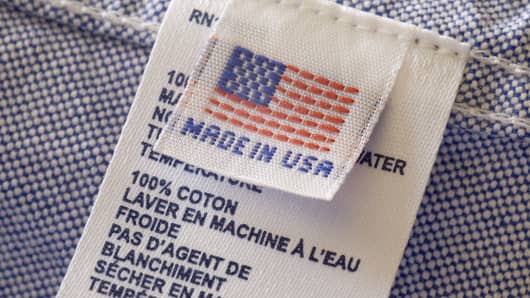At the end of 2013, the number of individuals renouncing their U.S. citizenship hit an all-time high. There is a similar trend occurring in the corporate world as global merger-and-acquisition activity picks up. The main driver for many of these deals: tax inversions, or tax-advantaged transactions. The congressional response thus far? Ready, fire, aim.
The Obama administration and members of Congress have proposed legislation to halt strategic inversion transactions, despite their business benefits.
Read MoreObama: What's legal might not be right for US
Rather than using "patriotism" as a performance metric, it's time for Congress to zero in on fixing and aligning U.S. corporate tax rules with other global tax regimes. While the recent inversion trend does indeed provide a natural platform for many to publicly call out these U.S. multinationals, the reality is that if "Made in the USA" is really a national economic goal, then Congress needs to fix the problem here at home and give U.S. multinationals the impetus to stay in the USA. Until then, who can blame U.S. companies for doing legitimate strategic deals to remain globally competitive? This is the core premise of capitalism, and what could be more American than that?
A tax inversion involves a U.S. multinational group re-incorporating outside the U.S. for tax purposes (i.e., the U.S. parent of the group is replaced with a non-U.S. parent). Since a U.S. multinational cannot re-incorporate simply by changing where its management and control is located and exercised, a strategic transaction with a non-U.S. company presents an immediate and palatable opportunity to accomplish a strategic tax inversion.
Why are we hearing about them more now? Well, it's no secret that U.S. multinationals collectively have over $2 trillion in foreign profits parked offshore largely because the U.S. taxes worldwide income — either currently or at some future date — and it's also no secret that the U.S. now has the highest corporate tax rate (combined federal and state rates can exceed 40 percent) in the developed world. Thus, many U.S. multinationals don't repatriate foreign earnings in order to defer incremental U.S. taxation. Contrast this with one solution – a territorial tax system (which all other G-8 countries have adopted) – which results in "one-and-done" taxation. Earnings are taxed only in the country in which the earnings are actually generated. The Obama administration vehemently opposes a true territorial system and congressional proposals to date still provide for some level of minimum U.S. tax to be levied on existing and future foreign earnings that are not repatriated (i.e., a "quasi-territorial" tax system at best).
Read MoreTaxes will go up if inversions rise: Mark Cuban
During weaker economic times, U.S. multinationals were more willing to take a "wait and see" approach on what corporate tax reform might happen and/or whether another "one-time" tax-favored repatriation holiday would be introduced to encourage repatriation. As the global economy has strengthened and U.S. multinationals are capped out on implementing "cost-cutting" measures to increase the bottom line, there has been an uptick in strategic transactions as more companies have opened the corporate checkbook to start strategically spending again. Furthermore, recent studies by the Joint Committee on Taxation estimating the approximate $96 billion cost to the U.S. government over 10 years would imply the prospect of another repatriation holiday is remote. Thus, for some U.S. multinationals, the time for waiting is over.
Make no mistake about it, the existing U.S. operations stay put in the U.S. and are still subject to U.S. tax as they were before. The foreign earnings are still subject to foreign tax just as they were before. Pretty simple — a strategic inversion essentially accomplishes territorial taxation for the U.S. multinational, so why wait for Congress to propose legislation that arguably will only further hinder a U.S. multinationals' global competitiveness if there is a viable foreign target out there? We have recently observed large U.S. multinationals (e.g., Apple) that will continue to fly the U.S. flag at corporate headquarters being publicly deposed for not willingly choosing to repatriate foreign earnings to willingly pay incremental U.S. taxation on their foreign earnings. Now, the public outcry over other U.S. multinationals inverting in connection with strategic business combinations.
Read MoreIs patriotism a virtue in business?
Darned if you do, darned if you don't. The recurring theme – U.S. companies are trying to maintain global competitiveness and leaning on tax strategies that fall squarely within the U.S. (and local country) tax rules to do so.
Commentary by Timothy R. Larson, the partner-in-charge of Marcum's tax- and business-services department for the New York City office. He specializes in advising clients on the U.S. tax aspects of international taxation as well as overall tax services; such as accounting for income taxes, compliance review and providing tax advisory services related to restructuring and acquisition/disposition planning.


